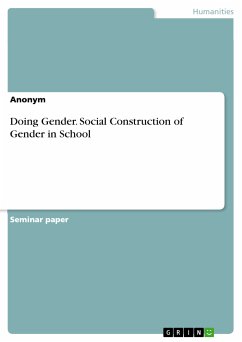
Doing Gender. Social Construction of Gender in School (eBook, PDF)

PAYBACK Punkte
0 °P sammeln!
Seminar paper from the year 2011 in the subject Gender Studies, grade: 1,3, Leuphana Universität Lüneburg, language: English, abstract: Gender role behavior is learned from an early age and encouraged by the role expectations of the environment. Thinking in two sexes results in ideas and expectations in every human being as to how one's own or the opposite sex should be or behave. These ideas are a formative and formative element in interaction and communication. In this way, "gender" is constantly being produced as a social construction in everyday life. This process is called "Doing Gender...
Seminar paper from the year 2011 in the subject Gender Studies, grade: 1,3, Leuphana Universität Lüneburg, language: English, abstract: Gender role behavior is learned from an early age and encouraged by the role expectations of the environment. Thinking in two sexes results in ideas and expectations in every human being as to how one's own or the opposite sex should be or behave. These ideas are a formative and formative element in interaction and communication. In this way, "gender" is constantly being produced as a social construction in everyday life. This process is called "Doing Gender". The institution of school is also a social system in which the construction of gender plays an important role. As part of this work, the topic of "Doing Gender" in primary school is dealt with. The aim is to work out how teachers contribute to the construction of gender in primary school. There are only a few studies on this not entirely uncomplicated field of school research to date. This is surprising, since teachers play an important role in the design of everyday school life. First, a basis for the further procedure is created by defining the terms "gender" and "doing gender". The next chapter deals in more detail with "gender" in primary school. For this purpose, the gender differences in terms of performance and interactions between pupils and teachers are also discussed. Afterwards, teaching examples will be used to show how "Doing Gender" takes place at school. The last chapter explains how gender differences and stereotyping can be avoided by means of a gender-sensitive school atmosphere. For this purpose, it is first presented what constitutes a gender-sensitive school, what challenges arise for the teachers and how the blockages to gender-sensitive action can be put an end to.
Dieser Download kann aus rechtlichen Gründen nur mit Rechnungsadresse in A, B, BG, CY, CZ, D, DK, EW, E, FIN, F, GR, HR, H, IRL, I, LT, L, LR, M, NL, PL, P, R, S, SLO, SK ausgeliefert werden.













